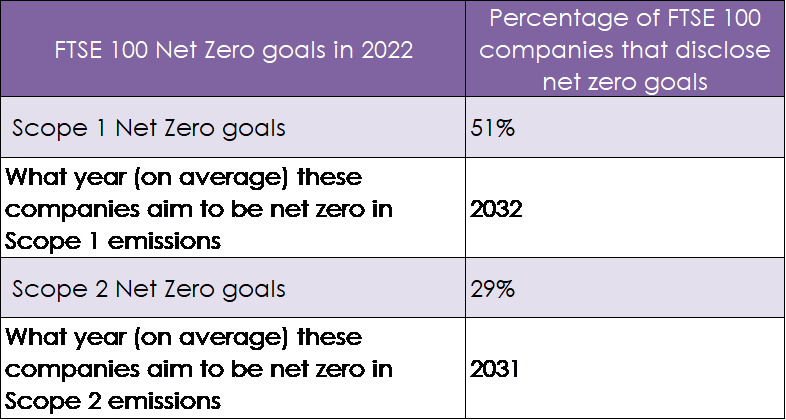82% of FTSE 100 companies now aim for ‘Net Zero’ emissions by 2050
Written by
82% of FTSE 100 companies have now committed to achieving ‘Net Zero’ emissions by 2050*, shows research by Boodle Hatfield, a leading private wealth law firm.
At the time of COP26 in November of last year only 60 FTSE-100 companies had signed up to achieve ‘Net Zero’ by 2050.
On average those 82 FTSE 100 companies aim to be Net Zero (Scope 3) by 2044 -putting them on track to be ‘Net Zero’ six years before the UK Government’s 2050 target.
Boodle Hatfield says that from FTSE 100 corporates to family businesses many companies are responding extremely positively to the challenge to reduce their carbon footprint. That push towards ‘Net Zero’ is creating opportunities for commercial landlords and operators of ‘green properties’ that companies increasingly want to occupy.
Sophie Henwood, Senior Associate at Boodle Hatfield says: “As businesses accelerate their plans for achieving Net Zero it is driving demand for ever more energy efficient buildings with a smaller and smaller carbon footprint.”
Sophie Henwood says that her commercial real estate team is also increasingly advising commercial landlords and their tenants on ‘green leases’. These are leases which contain contractual clauses requiring tenants and landlords to undertake responsibilities with regards to the sustainable occupation of the building. Examples include energy, water and waste efficiency measures, recycling performance requirements and data sharing.
Companies that want to improve their environmental impact will be looking for premises that are energy efficient with green energy supplies set up. .
Katherine Worrall, Associate at Boodle Hatfield says: “The push to Net Zero has led to a real noticeable demand in the most energy efficient buildings. For a new corporate headquarters it used to be a “nice to have” now a low carbon footprint is moving towards a “must have”.”
“Smaller companies may want to look at what the FTSE 100 companies are doing in this area and decide whether they want to benchmark themselves against their bigger peers.”
71 FTSE 100 companies now report their full emissions – these companies are responsible for an estimated combined 3 billion tons of CO2e (tons of carbon dioxide equivalent) every year. This works out at an average of 41 million tons produced by each company. By comparison, the average Briton is currently responsible for about 6.3 tons of CO2e every year**.
Katherine Worrall says: “‘Net Zero’ initiatives are creating commercial opportunities for landlords and operators. Studies have shown low carbon commercial properties attract both higher rents and higher occupancy rates than less energy efficient properties.”
2044 is average year by which FTSE100 companies pledge to be Net Zero
In order for a company to be ‘Net Zero’ it must achieve neutrality across the three scopes of emissions. These emissions scopes are divided into a company’s own operations (Scope 1), the indirect emissions generated from the energy they use (Scope 2) and across their value chain (Scope 3).
Of the 51 FTSE 100 companies which disclose their Scope 1 goals, the average year by which they aim to achieve ‘Net Zero’ status is 2032. For the 29 companies with Scope 2 ‘Net Zero’ goals, the average year is 2031.


*Analysis of Annual Reports and Sustainability Reports of FTSE 100 companies. Scope 3 ie including carbon emissions from their supply chain and broader value chain
** The calculation is derived from dividing total UK territorial emissions in 2021 (Gov.uk) by the UK population (ONS, 2020)
Extracts from this press release were covered by Wealth DFM HR Magazine and IFA Magazine in August 2022.


